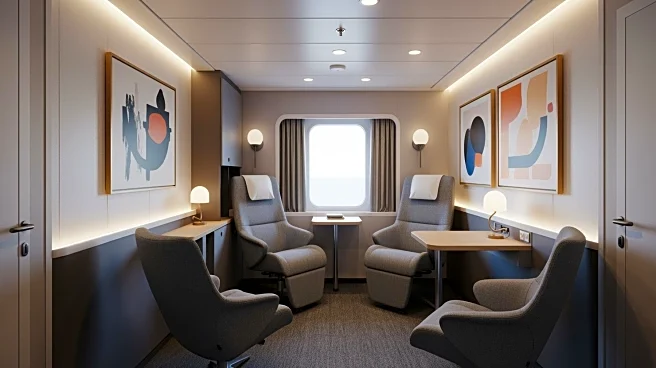What's Happening?
NYK and Tama Art University (TAU) have concluded their second co-creative research project focused on improving the well-being of seafarers through innovative onboard space design. The project, titled
'Cozy・Comfy — Discovering Joy in Work and Life at Sea,' was presented at NYK's head office in Tokyo on September 26. Seventeen students from TAU's Product Design Course participated, unveiling design proposals aimed at enhancing the work and living environments for future generations of seafarers. The initiative seeks to address the unique challenges faced by seafarers, who often spend extended periods at sea, by reimagining their living spaces to promote comfort and joy.
Why It's Important?
The collaboration between NYK and TAU highlights the growing recognition of the importance of mental health and well-being in the maritime industry. Seafarers often face isolation and stress due to long periods away from home, which can impact their mental health and job performance. By focusing on spatial design, the project aims to create environments that support seafarers' well-being, potentially leading to improved job satisfaction and productivity. This initiative could set a precedent for other maritime companies to prioritize the mental health of their employees, fostering a healthier and more sustainable work environment.
What's Next?
The design proposals from the project may influence future shipbuilding and retrofitting efforts, as companies seek to implement these innovative ideas to enhance seafarer well-being. Stakeholders in the maritime industry, including shipbuilders and operators, may consider adopting these designs to improve the quality of life for seafarers. Additionally, further research and collaboration between educational institutions and industry leaders could continue to drive advancements in this area, promoting a culture of well-being within the maritime sector.
Beyond the Headlines
This project underscores the broader trend of integrating wellness into workplace design, reflecting a shift towards more holistic approaches to employee care. The focus on spatial design for seafarers could inspire similar initiatives in other industries where employees face challenging work environments, such as offshore oil rigs or remote research stations. The ethical dimension of ensuring employee well-being is increasingly becoming a priority for companies, aligning with global movements towards sustainable and responsible business practices.











